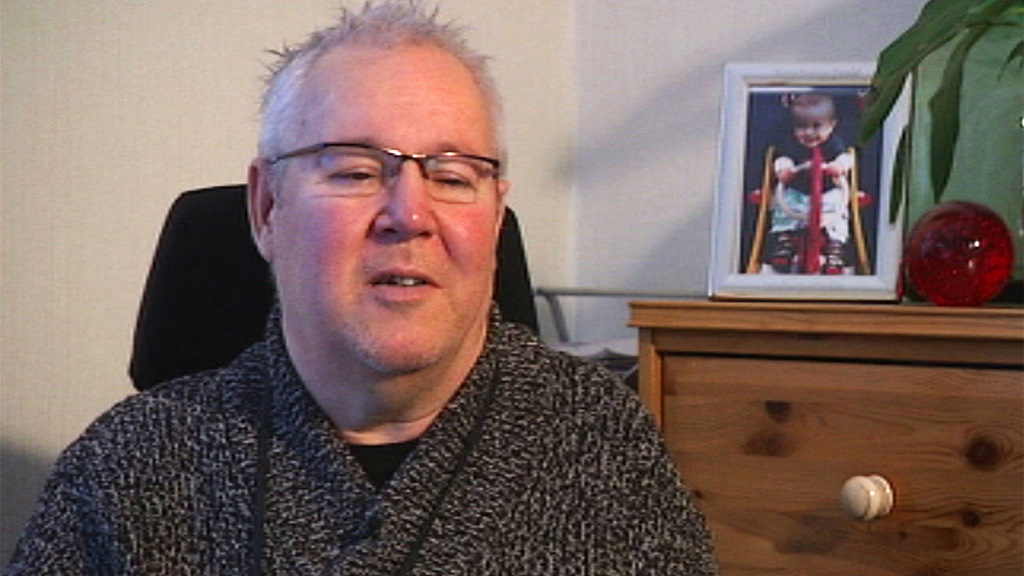Let me choose when and where to die
 Victoria Macdonald
Health and Social Care Editor
Victoria Macdonald
Health and Social Care Editor
Paul Lamb, who has been paralysed and in severe pain for 23 years, is seeking the legal right for a medically assisted suicide at a time of his choosing.
As Mr Lamb, aged 58, takes up a legal challenge seeking to allow doctors to help him die, an anonymity order has been lifted allowing him to speak out about his life and his desire to choose when and where he is able to end his life.
Speaking to Channel 4 News, Mr Lamb said that the pain can be so bad at times he doses himself up on ketamine until he is knocked out. And that he believes his life is never going to get better – if anything, he said, it will only get worse.
Sitting in his wheelchair in his bedroom, Mr Lamb said he had been inspired to carry on the fight that Tony Nicklinson had started. Mr Nicklinson, who had locked-in syndrome, lost his High Court case last year to make it legal for a doctor to help him die. The judges ruled that the current law did not breach human rights and it was for parliament, rather than the courts, to decide whether it should be changed. He died six days later.
But now Mr Lamb will join Mr Nicklinson’s widow Jane in a case to be heard next month at the Court of Appeal. Mrs Nicklinson is pursuing a claim in her own right that her rights were breached under Article 8 of the European Human Rights Convention because she suffered pain, distress and injury as a result of having to witness the cruel, distressing and painful life which her husband suffered as he was not able to end his own life.
Becoming a hermit
Mr Lamb was injured in a road accident in 1990. He has quadraplegia and has no function in any of his limbs apart from the slightest movement in his right hand.
He is cared for round the clock but has found it increasingly difficult to leave his bedroom at the top of his house. “I am becoming more and more of a hermit,” he told me. “Not least because I have no thermostat so in cold weather, even when I am dressed up, my temperature drops.”
But it is listening to Mr Lamb’s description of his pain that is the hardest. He speaks with little pity but he is quite frank that things are not going to get any better. They are, though, he said, going to get a lot worse.
“Horrendously worse,” he said.

And there is also the tedium of his daily life. On the days when he cannot be taken out, or simply cannot face it, he is hoisted out of bed, showered, dressed, and put into the wheelchair. “A lot of days,” he said, “I want to get back into bed.”
The cruelty of the condition means, however, that he cannot spend more than a day there.
“I describe it like rigor mortis setting in. Even when I am resting up the pain gets worse. It is getting rigor mortis without waiting until I have died,” he said.
Right to choose
Mr Lamb’s marriage broke up sometime ago. His son lives nearby with his grandson and his sister is close to him. He said they both support him in his bid to win this right to die. Interestingly, he says he does not want to die right now or even soon. This is about choice.
“I would like a doctor to help me to die, without pain and suffering, preferably by a lethal injection with my family around me in my own home,” he said.
There have, of course, been other attempts to have the law changed including that Debbie Purdy, who has multiple sclerosis. She wanted her husband freed from the threat of prosecution if he travelled to the Dignitas clinic in Switzerland to die. The Law Lords agreed that Ms Purdy did have the right to know if her hsuband would be affected and later the Director of Public Prosecutions clarified when a person was more or less likely to be prosecuted.
So far none of the relatives of the nearly 100 people who have gone to die at Dignitas have been prosecuted.
There as also the case in 2002 of Diane Pretty who had motor neurone disease. She lost her attempt to win the right for her husband to be allowed to help her die.
I asked Mr Lamb about these cases and the general ruling – as in the Nicklinson case – that it is for parliament to decide. He said that if he was a “useful tool” then he wanted to do it.